| Year | Name | Notes |
|---|---|---|
| 2025 | TBA | |
| 2024 | Nicole Gonzales Howell | |
| 2023 | Amy Vidali | |
| 2022 | Sugie Goen-Salter | |
| 2021 | Ryan Skinnell | |
| 2019 | Linda Adler-Kassner | |
| 2018 | Andrea Lunsford | |
| 2017 | Chris M. Anson | |
| 2016 | Chitra Divakaruni | |
| 2015 | Doug Hesse | |
| 2014 | Adam Banks | |
| 2013 | Cynthia Selfe | |
| 2012 | Sheridan Blau | |
| 2011 | Howard Tinberg | |
| 2010 | Lois Powers | |
| 2009 | Cheryl Glenn | |
| 2008 | Jody Millward | |
| 2007 | Kim Flachmann | |
| 2006 | John Lovas | Awarded posthumously |
| 2005 | Gabrielle Rico | YRC Cofounder |
| 2004 | Hans P. Guth | YRC Cofounder |
| 2003 | n/a | Tribute to adjunct instructors |
| 2002 | n/a | |
| 2001 | n/a | All Rhetoricians overlooked by the Academy |
| 2000 | Shirley Logan | |
| 1999 | Victor Villanueva | |
| 1998 | Nell Ann Pickett | |
| 1997 | Winifred Bryan Horner | |
| 1996 | Anne Ruggles Gere | |
| 1995 | Sondra Perl | |
| 1994 | Donald McQuade | |
| 1993 | Lynn Quitman Troyka | |
| 1992 | Peter Elbow | |
| 1991 | Maxine Harrison | |
| 1990 | Shirley Brice Heath | |
| 1989 | Edward P.J. Corbett | |
| 1988 | Bob Gorrell |
2021: Ryan Skinnell, San Jose State University
Presented By: Amber Sylva, San Jose State University
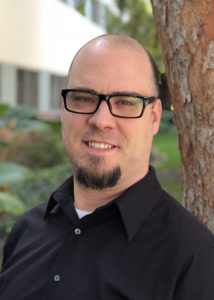
Ryan Skinnell is an Associate Professor of Rhetoric and Composition and Assistant Writing Program Administrator in the Department of English & Comparative Literature at San José State University (SJSU). He has taught rhetoric and writing classes at five universities to all levels of students, including a summer seminar for faculty at the National University of Modern Languages in Islamabad, Pakistan. He is also an SJSU faculty media expert in political speech, politics, and rhetoric as well as an OpEd Project Public Voices Fellow.
Dr. Skinnell studies political rhetoric and public discourse, especially as it relates to authoritarianism, demagoguery, and extremism. He has related interests in bureaucracy, institutional rhetoric, histories of rhetoric and writing (particularly in higher education), historiography, and archival research. Dr. Skinnell has published six books, including Faking the News: What Rhetoric Can Teach Us About Donald J. Trump (2018) and Rhetoric and Guns (forthcoming 2021). He has also published more than 80 articles, book chapters, and op-eds, and has given more than 80 presentations to academic and non-academic audiences on topics ranging from demagoguery, fascist rhetoric, and contemporary political discourse to American education, bureaucracy, and faculty development. He is currently working on a book about how Adolf Hitler used rhetoric to persuade millions of Germans to support, or at least acquiesce to, Nazism. For a full CV, please visit RyanSkinnell.com.
2019: Linda Adler-Kassner, UC Santa Barbara (UCSB)
Presented By: Kelly Harrison, Stanford University
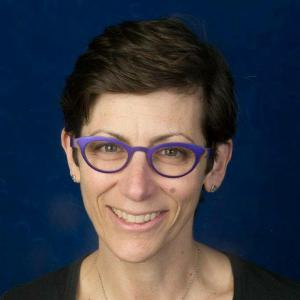
For more than 25 years, Linda Adler-Kassner has been a writing teacher, researcher, and author. Her most recent book, co-edited with Elizabeth Wardle and published in 2015, is Naming What We Know: Threshold Concepts of Writing Studies. Dr. Adler-Kassner is currently a Professor of Writing Studies, Associate Dean of Undergraduate Education, and Director of the UCSB Center for Innovative Teaching, Research, and Learning, where she teaches both undergraduate and graduate courses that focus on writing as a subject of study.
2018: Andrea Lunsford, Stanford University
Presented By: Kelly Harrison, Stanford University and San José State University
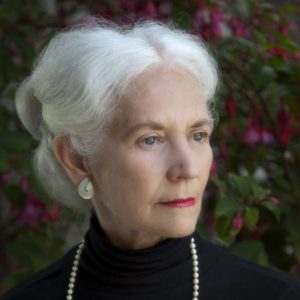
Dr. Andrea Lunsford is readily known nationally and internationally because of her leadership in the field. She has been Chair of the Conference on College Composition and Communication, and for the Modern Language Association, she has chaired its Division on Writing and been a member of its Executive Council.
Dr. Lunsford came through the ranks to those positions: She has taught at the high school and community college levels in Florida, been a Distinguished Professor of English and the Director of the Study and Teaching of English at The Ohio State University, been the Director of the Program for Writing and Rhetoric at Stanford University, and is currently the Louise Hewlett Nixon Professor of English Emerita, Claude and Louise Rosenberg Jr. Fellow from Stanford, and continues as faculty member for the Bread Loaf Graduate School of English faculty.
Dr. Lunsford has been tapped to share her expertise throughout North America in workshops on writing and for program reviews at myriad universities. Her work spans from articles and chapters on rhetorical theory, women in rhetoric, collaboration, cultures of writing, style, the graphic novel, and technologies of writing, to 19 books that she has written or coauthored. Perhaps you have read the 2001 article in Diane Belcher and Alan Hirvela’s Linking Literacies: Perspectives on L2 Reading-Writing Connections: “Lessons on Linking Literacies”. Maybe you have used Everything’s an Argument, The Everyday Writer, or The St. Martin’s Handbook in your classes. In graduate school, you may have read her chapter “Janet Emig’s ‘Writing as a Mode of Learning’” in Teaching Writing, edited by Christina R. McDonald and Robert L. McDonald.
And we have more to look forward to: She is currently the general editor of The Norton Anthology of Rhetoric and Writing, forthcoming.
2017: Chris M. Anson, North Carolina State University
Presented By: Sterling Warner, Evergreen Valley College

Chris Anson is a Distinguished University Professor and Director of the Campus Writing and Speaking Program at North Carolina State University, where he teaches graduate and undergraduate courses in language, composition, and literacy and works with faculty across the disciplines to enhance writing and speaking instruction. He has published 15 books and over 120 articles and book chapters relating to writing and has spoken widely across the US and in 30 other countries. He serves on the editorial boards of seven peer-reviewed journals. He has received numerous teaching awards and participated in over $2 million in grants. He is Part Chair of the Conference on College Composition and Communication and Past President of the Council of Writing Program Administrators, and was recently elected to the Steering Committee of the International Society for the Advancement of Writing Research. His full CV is at www.ansonica.net.
2016: Chitra Divakaruni, University of Houston
Presented By: Sterling Warner, Evergreen Valley College
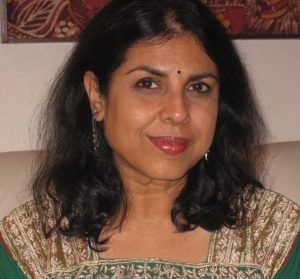
Chitralekha Banerjee Divakaruni was born in Kolkata (Calcutta). India. She received her BA from the University of Calcutta in 1976, her MA from Wright State University, and a PhD from the University of California, Berkeley in 1985. Divakaruni put herself through graduate school by taking on odd jobs, working as a babysitter, store clerk, bread slicer in a bakery, laboratory assistant at Wright State University, and dining hall attendant at International House, Berkeley. A two-year college veteran, she taught at Foothill College in Los Altos and Diablo Valley College in Pleasant Hill, California. She now lives in Texas, where she teaches at the University of Houston Creative Writing Program. Divakaruni cofounded and served as former president of Maitri, a helpline founded in 1991 for South Asian women dealing with domestic abuse. Divakaruni serves on its advisory board and on the advisory board of a similar organization in Houston, Daya. She also sits on the Houston board of Pratham. a nonprofit organization working to bring literacy to disadvantaged Indian children. Divakaruni’s work has been published in over 50 magazines and translated into 20 languages, including Dutch, Hebrew, Indonesian, and Japanese. Her two latest volumes of poetry are Black Candle and Leaving Yuba City. Divakaruni’s first collection of stories, Arranged Marriage, won an American Book Award, PEN Josephine Miles Award, and Bay Area Book Reviewers Award. Her major novels include The Mistress of Spices, Sister of My Heart, Queen of Dream, Oleander Girl, and most recently, Before We Visit the Goddess.
2015: Doug Hesse, University of Denver
Presented By: Sterling Warner, Evergreen Valley College
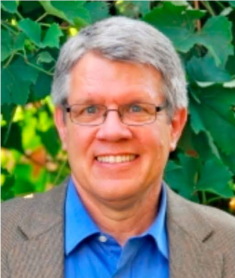
Doug Hesse is Professor and founding Executive Director of Writing at the University of Denver, where he was named University Distinguished Scholar. Hesse is currently President-Elect of the National Council of Teachers of English. Previously, he chaired the Conference on College Composition and Communication, was President of the Council of Writing Program Administrators, and held leadership roles within MLA. He spent 20 years at Illinois State University, where he directed the writing program, Center for the Advancement of Teaching, and University Honors Program. Hesse’s numerous articles and four coauthored books focus on creative nonfiction and the personal essay; on narrative, rhetoric, and belles lettres; and on professional issues in writing programs. He has been keynote or plenary speaker at some 40 conferences and has consulted and completed program reviews at some 50 colleges and universities. His current projects include a longitudinal study of 60 undergraduate writers, archival work on the correspondence of the first astronomer at the University of Denver, collection of personal essays, and defense of journalism in composition studies. Hesse’s PhD is from Iowa. He’s an avid hiker and photographer, and he sings professionally with the Colorado Symphony Orchestra Chorus.
2014: Adam Banks, University of Kentucky
Presented By: Sterling Warner, Evergreen Valley College
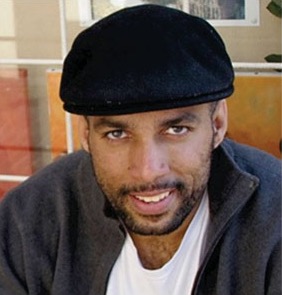
Born and raised in Cleveland, Ohio, and educated at the Cleveland Public Schools, Adam Banks received his BA in English from Cleveland State University and his MA and PhD both in English from Penn State University. Professor Banks is currently Professor of Writing, Rhetoric, and Digital Studies (WRD) at the University of Kentucky, where he teaches courses in African American Rhetoric, digital rhetorics, community literacy, and rhetoric and composition theory. He is also the Director of WRD for 2013-2014. Previously, he has been Associate Professor of Writing and Rhetoric for Syracuse University’s Writing Program. He is the author of the award-winning Race, Rhetoric, and Technology: Searching for Higher Ground, a book challenging teachers and scholars in writing and technology fields to explore the depths of Black traditions more thoroughly and calling African Americans to make technology a central area for struggle. Southern Illinois University Press released his second book, Digital Griots: African American Rhetoric in a Multimedia Age, in its Writing and Rhetoric series.
Dr. Banks spent Fall 2011 as a Visiting Scholar in Comparative Media Studies at Massachusetts Institute of Technology (MIT), where he is beginning work on a new book reexamining the “Talking Book” literacy trope for our current digital age. During the Spring 2010 semester, he served as Langston Hughes Visiting Professor of English at the University of Kansas, where he taught courses on African American rhetoric, new media, and technologies. Banks sees community work as deeply connected to his growth as a teacher and intellectual, and has developed and delivered several projects in Lexington, linking African American rhetorical traditions to current realities and futuristic visions for activism and community building. Banks served as Assistant CCCC Chair and program planner for the 2014 CCCC conference in Indianapolis, and will Chair the CCCC in 2014.
2013: Cynthia Selfe, The Ohio State University
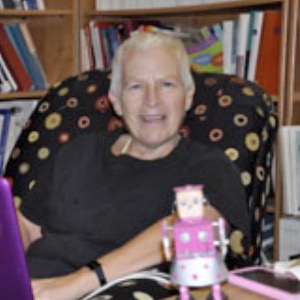
Cynthia Selfe is currently Distinguished Humanities Professor in the Department of English at The Ohio State University. She lives in Columbus, Ohio along with her husband and fellow scholar Richard “Dickie” Selfe and their two dogs Sparky and Lucy.
Selfe was an early champion of the field of computers and writing along with a number of other scholars, including her frequent collaborator Gail Hawisher and other pioneers such as Hugh Burns. Selfe has worked tirelessly to draw humanists’ attention to the sociocultural milieu in which technology circulates, to consider how technology affects literacy in context, and to broaden humanists’ understanding of “the text” based and print-based genres. Selfe’s 1999 Chair’s address to the Conference on College Composition and Communication, “Technology and Literacy: A Story about the Perils of Not Paying Attention”, was influential in drawing disciplinary attention to technology in composition studies and the digital humanities.
Cynthia Selfe completed her PhD at the University of Texas-Austin and worked for a number of years at Michigan Technological University before moving to The Ohio State University. Along with Hawisher, Selfe founded the peer-reviewed journal Computers and Composition in the 1980s. She founded the Digital Archive of Literacy Narratives at https://www.thedaln.org/, along with H. Louis Ulman of The Ohio State University. She is also a founding coeditor of the Computers and Composition Digital Press (CCDP), a peer-reviewed scholarly press for born-digital publications that are reviewed and published through Utah State University Press.
The first woman and first English teacher ever to receive the EDUCOM Medal for innovative computer use in higher education, Selfe has authored or edited a number of works on digital technology, both alone and in collaboration with colleagues. Along with Scott DeWitt, she is the Director of OSU’s annual Digital Media and Composition (DMAC) summer institute, and she also coordinates the English Department’s program of Visiting Scholars in Digital Media and Composition.
